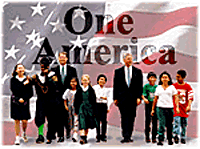 |
 |
The Metropolitan Human Rights Center (MHRC) was started in the 1970s to address concerns about the racial integration of blacks and whites in Portland's schools and housing. As the city's ethnic and racial population has broadened to include people of Hispanic, Southeast Asian, Russian and Romanian descent, the mission of MHRC has expanded to ensure that all ethnic groups feel like valued members of the metropolitan community. While MHRC currently has a number of different programs that allow people to express their concerns about Greater Portland, the center operates two programs that specifically address race relations in the community. The Dynamic Differences Program was initiated in 1992 to raise awareness of the dynamics of bigotry and to teach people skills about dealing with bigotry. The Community Dialogues on Race Relations Program was created in 1996 to encourage community discussion of race-related issues.
Led by a biracial team composed of two volunteers, the Dynamic Differences Program is a 2 ½-hour workshop where 20 participants are trained in basic theories of prejudice and bigotry. Following a formal presentation, participants are divided into smaller groups where they engage in "role playing," alternatively playing the role of the bigot and the target of bigoted behavior. At the end of the session, the participants must develop a personal action plan outlining a strategy for how they will contribute to lessening the amount of bigotry in their lives and in their communities. The workshops are held two to three times each month throughout the city, and they are free to the public. The Community Dialogues on Race Relations Program is also led by a biracial team of one full-time staff and one volunteer. The dialogues are designed to generate open, honest and inclusive dialogues that inspire participants to seek out more information on issues related to race. In order to preserve the quality of the dialogue, facilitators limit participation to 25 people, and they actively pursue a number of strategies for creating a comfortable and safe atmosphere for the group discussions. The discussions are free and held twice each month.
Outcomes and Significant Accomplishments Both the Dynamic Differences Program and the Community Dialogues on Race Relations Program have received several requests from people who want to be trainers as well as people who want to attend the actual programs. Many participants have reported that, as a result of being in these programs, they have gotten to build strong relationships with people of different races. Participants in each of the programs must fill out an evaluation form immediately following the presentations. Dynamic Differences has attempted to further evaluate its impact by sending attendees a follow-up survey approximately six weeks after the program to determine the results of their personal action plans.
|
![]()
To comment on this service,
send feedback to the Web Development Team.
![[White House icon]](/New/images/home_pin.gif)
![[Help Desk icon]](/New/images/help_pin.gif)